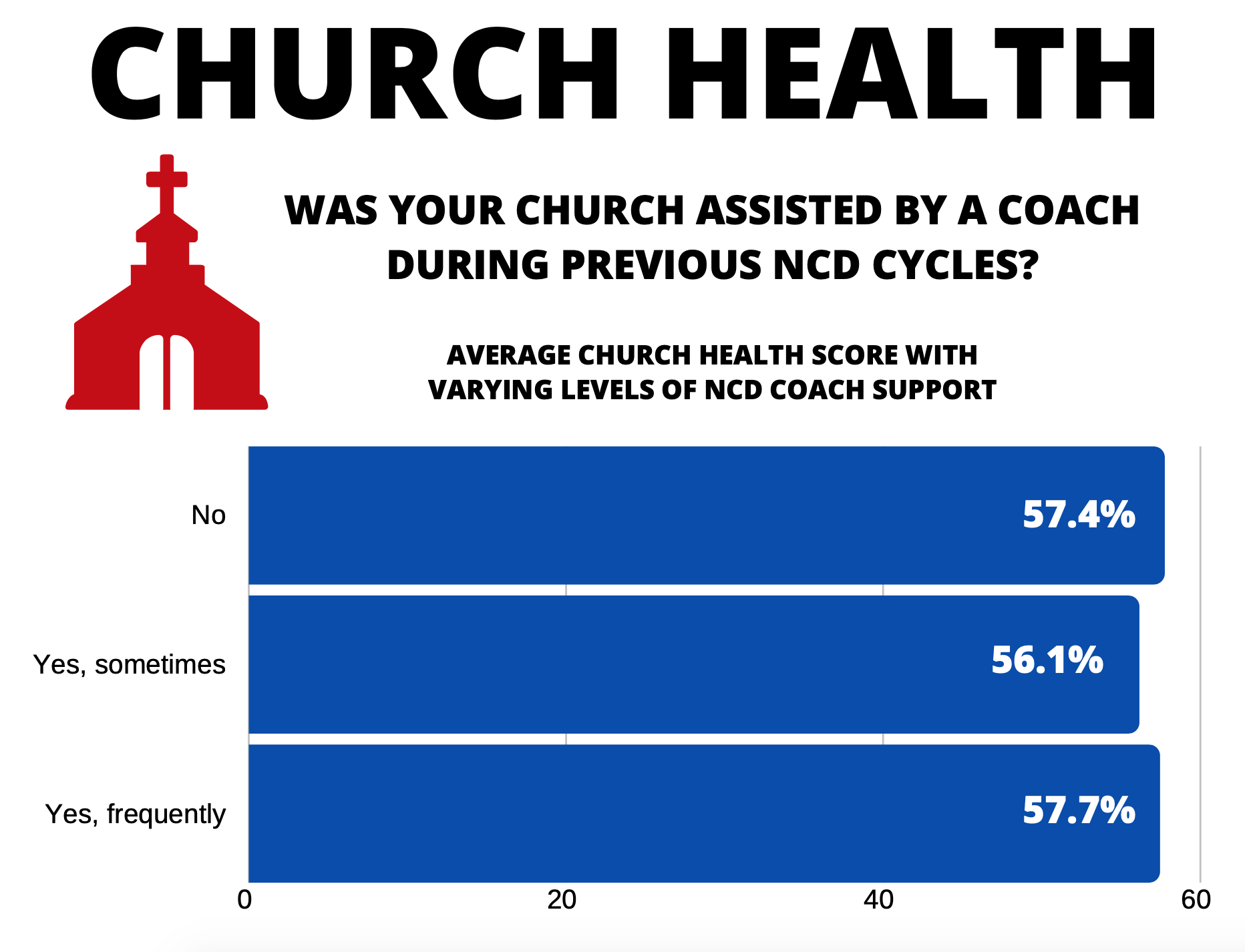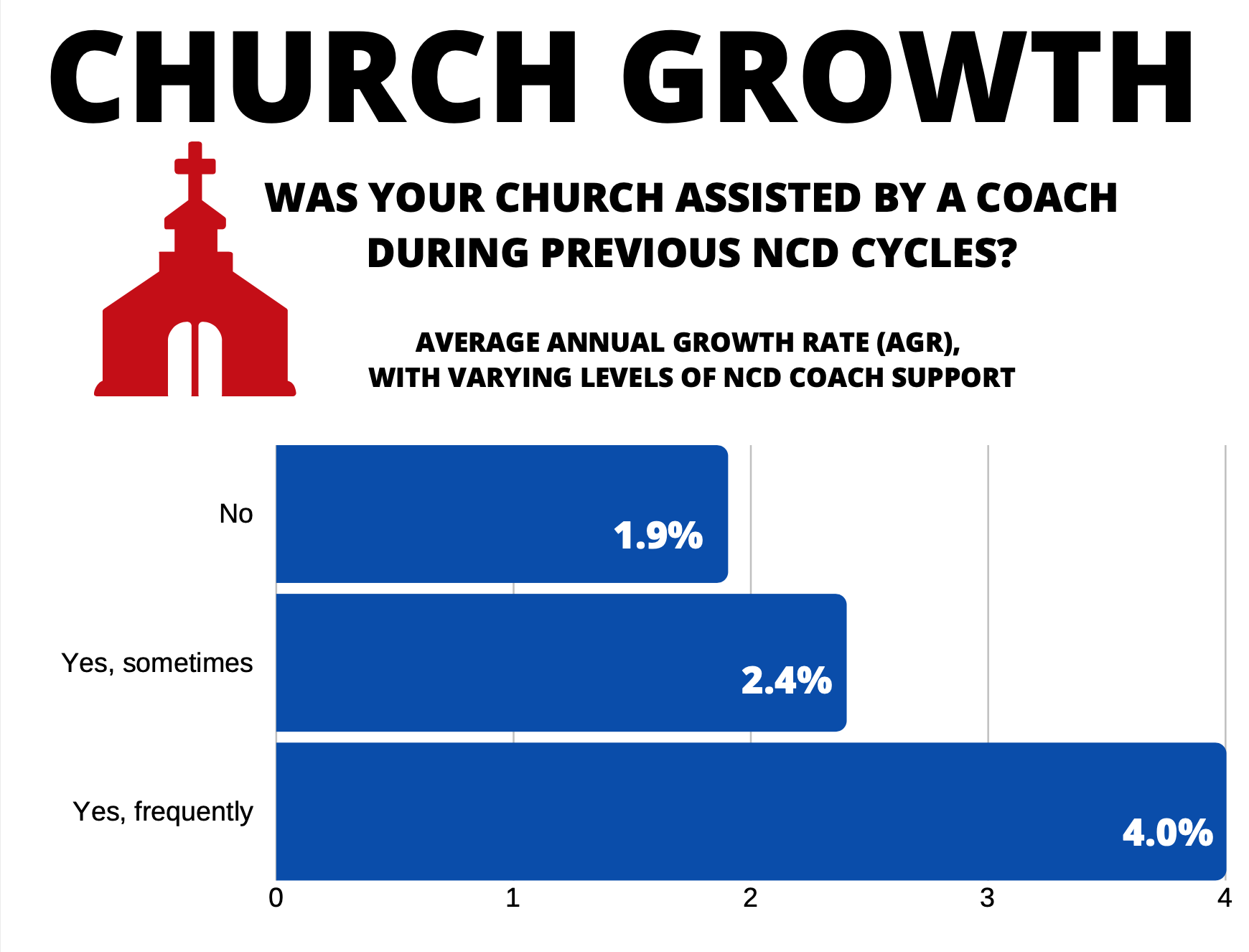Coaching Makes a Difference
“You will never maximize your potential in any area without coaching. It is impossible. You may be good. You may even be better than everyone else. But without outside input you will never be as good as you could be. We all do better when somebody is watching and evaluating.” -Â Andy Stanley
This is a strong endorsement for having a coach. Think of Michael Jordan without Phil Jackson. Or the people in your own development as a leader who helped you navigate transitions, listened empathetically during trying circumstances, and supported you to alter derailing behavior.
Most of us understand this intuitively. When we workout with a partner, we tend to run faster, lift more weight, and perform at a higher level than if we workout alone. A coach is like that. But what is the return on investment (ROI) of having a coach? Can the impact be empirically measured?
Recently, I asked Petr Cincala of NCD America to cull the NCD database to illustrate the impact on churches when working through the NCD Cycle with a NCD Coach. From his research, I selected a data point that seemed to float to the surface. Unfortunately, it did not tell the story I had hoped!
Disheartening news. The very thing I believed to be true wasn’t empirically supported. How can this be?
CHURCH HEALTH
Churches that used a coach during the NCD Cycle saw a negative correlation in church health.
Petr designated this category as a point of interest. If we select only the latest profiles of churches that have done more than one profile in the last 10 years, this one question stood out from the rest:
WAS YOUR CHURCH ASSISTED BY A COACH DURING PREVIOUS NCD CYCLES?

Disheartening news
There is no positive impact on the health of a congregation when a church utilizes a coach during the NCD Cycle. That is, the positive correlation that you would expect to see from having a coach vs. not having a coach is not supported by the data. In fact, the data suggests the opposite, albeit a delta of -0.3, for those churches that used a coach frequently vs. churches that did not utilize a coach, is nothing to get excited about.
CHURCH GROWTH
Churches that used a coach during the NCD Cycle saw a positive correlation in church growth.
However, those same congregations were asked to provide another important piece of information, their Annual Growth Rate using worship attendance as the measure.
Remember the question:
WAS YOUR CHURCH ASSISTED BY A COACH DURING PREVIOUS NCD CYCLES?

When we compare the Annual Growth Rates (AGR) we see an intriguing correlation. Those churches that used a coach frequently experienced a positive change in their Annual Growth Rate (AGR). A delta of +2.1% AGR was experienced by those churches that frequently used the assistance of a coach during the NCD Cycles vs. those churches that did not receive assistance from a coach during the NCD Cycle.
The impact of using a coach has a positive impact on Church Growth.
There is numerical growth occurring in congregations when a church engages with a coach in the NCD Cycle. However, as Christian Schwarz so clearly states: “Not every growing church is also a qualitatively ‘good’ church”.
This raises two important questions:
- Do churches that engage an NCD Coach grow numerically?
- Do churches that avoid using an NCD Coach grow qualitatively?
I would suggest the data is inconclusive at this stage. Instead, I would propose two responses.
How should we respond?
Response #1 Education – inform church leaders of the value of a coach
Church Leaders need to be educated on the value of coaching.
In 2009 an article was written in the Harvard Business Review entitled “What can Coaches do for you?†They invited five experts to comment on data from a survey of 140 leading coaches. They arrived at a number of interesting insights, but one point relates to our conversation on education. They asked the 140 coaches the main reasons executives employed their services. Church leaders who remain open, curious and committed to learning about how to use a coach might find the following list beneficial.
3 Reasons Coaches are engaged:
- Develop high potential or facilitate transition – 48%
- Act as a sounding board – 26%
- Address derailing behavior – 12%
Think of that for a moment. When a church organizes a Church Health Team (CHT) to facilitate the NCD Cycle in their congregation, which of these reasons are relevant? Â Then ask yourself if it is wise to have a coach to help your church navigate the NCD Cycle. Again, I believe most of those reading this blog, intuitively agree with Andy Stanley’s take on the value of coaching.
Response #2 Coach Training – equip NCD Coaches in the coaching process
Move from conscious, incompetence to unconscious, competence.
Remember when you first learned to drive a car using a stick shift? You began with at an unconscious level of understanding of how and when to engage the clutch, then you moved to a level of awareness (what you knew) and a growing awareness of things you knew (you didn’t know). Eventually moving from doing things consciously to doing those same actions, automatically.
Coaching is similar to learning to drive a car. Initially it is clunky but over time, repetition helps the coach begin listening and asking questions intuitively with profound insights for the leaders and team they serve in their self-discovery process. Speaking from 30+ years of experience empowering leaders through coaching; my abilities and effectiveness have improved now – amassing over 10,000 hours of coaching.
It was clear to the NCD America Coach training team that more attention needed to be given to equipping NCD Coaches. There simply has not been enough time dedicated in the Stage I training, to equip leaders in the coaching process. That is why NCD America has collaborated with InFocus to create a Stage II level training called the NCD Coach Collective.
 Back to the data.
When I asked Petr what his observation was from the data, this is what he said:
“Churches that frequently utilized coaches in the implementation of the NCD-cycle tend to be a bit healthier than those churches who did not. However, the secret of coaching is yet to be discovered…”
Here is the benefit to a CHT having an NCD Coach:
- Develop the high potential of a CHT as it facilitates the change process throughout the NCD Cycle.
- Act as a sounding board to help the CHT process the emotional toll booth as they embrace their Church Profile, discover root issues behind their Minimum Factor and take action to advance their church’s health.
- Remove the obstacles to church health – just as it is important to take action it is just as crucial to create awareness and stop doing certain things that are obstructing health.
The power for a CHT of having an NCD Coach facilitate the NCD Cycle may not be empirically measured through the data to date. But we should ask the question based on our collective experience; Do churches with a coach facilitating the NCD Cycle with their CHT outperform those churches without a coach? Anecdotally – the answer is “Yes!”
Dr. Gary B. Reinecke is the Executive Director of InFocus (www.infocusnet.org) and trains leaders world-wide in the coaching process and skills.  He has been coaching leaders for disciple-making, leadership development and church multiplication since 1988.  Gary co-authored the Coaching 101 Handbook and Developing Coaching Excellence.  He received the designation of Master Certified Coach with the International Coach Federation in 2018. Gary and his wife Gina live in Southern CA – they have two young adult children, Joel and Zoe. You can reach Gary at greinecke@infocusnet.org
References
Harvard Business Review. What can coaches do for you? Retrieved from https://hbr.org/2009/01/what-can-coaches-do-for-you
Schwarz, C. A. (1996). Natural Church Development. Carol Stream, IL.: ChurchSmart Resources, pp. 20-21.
Stanley, A. (2003). The next generation leader. Sisters, OR: Multmonah Publishers Inc., p. 104.
